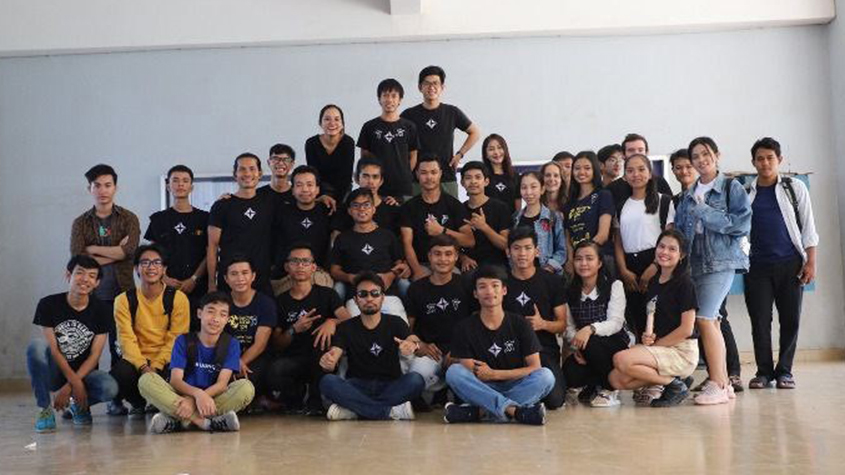Changing Mindsets and Empowering Young People with IT Curiosity and Ability
Computer-native children will be the information and communication technology dreamers and creators of our near future. That is if children have access to a computer, and more importantly, if they can use it as a tool to match the agility of their mind, according to Rithy Thul, co-founder of KOOMPI, the first and only locally founded laptop manufacturer in Cambodia.
KOOMPI was launched in August 2018, with the main purpose of providing efficient and affordable alternative Linux-based laptop computers for students and small businesses, with its open-source operating system: KOOMPI OS.
Before founding KOOMPI in 2011, Mr. Thul co-founded Small World, which started by providing a collaborative workspace environment for entrepreneurs and evolved into an umbrella company, raising investment capital to fund new start-up projects in the realms of technology, in particular computer science, such as KOOMPI.

The 34-year-old said “we did not start KOOMPI because we wanted to start a company, but because we wanted to provide an alternative tool and an open-source operating system that does not rely on proprietary software.”
Although the idea germinated in the co-founders’ minds as soon as 2013, it took five years of research and development to launch KOOMPI. For the last two and a half years, the company has been testing the products with the public gaining between 3,000 and 5,000 OS users.
Reasonably Priced Laptops for Students coupled with KOOMPI OS Project
In Cambodia and many developing countries, most students, in particular in remote areas, cannot afford to spend US$1,000 on a computer, which is the entry-level price for an Apple MacBook, according to Mr. Thul. KOOMPI E11, which was designed for students, cost just a little over US$150. “KOOMPI E11 can perform about 90 percent of the tasks that I need to carry out and is only challenged by some heavy programs that any US$1,000 computers would have trouble with,” he said.

Some customers opted for the full package: the KOOMPI laptop and the KOOMPI OS, some preferred to buy the laptop and install Windows on it, and some others downloaded KOOMPI OS on their existing hardware. Many of the students use both Microsoft Windows and KOOMPI OS alongside, he said. “We would like to see more of that happening because our goal is to spread the word about open source, and put the power of open source in the hands of students and empower them to be super users of the computer age.”
KOOMPI is currently the only Cambodian computer company. It picked up after a failed attempt in 2009 by another start-up. From three people at the start, the young staff (the average age is 23) is now close to 30.
The Mastermind behind KOOMPI – from Selling Bikes to Programming
Mr. Thul was not initially a computer geek. Born on an island, he never had the chance to access a computer until he went to university where he enrolled in a computer class, discovered out of curiosity, and challenged himself to hack some Skype accounts. His main course, however, was English literature, and he followed his dream of traveling by riding his bicycle around Cambodia, becoming a tour leader for a travel company, and running a bicycle business.
His interest in computers returned as he was working in an orphanage and someone gave him an out-of-order and outdated IBM machine, which he successfully got to work after a month’s worth of effort.

Mr. Thul started by customizing computers and the operating system from old discarded laptops, building one upgraded laptop with 2 or 3 discarded ones. After he launched an appeal on a Yahoo group for old computers, he ended up with two full rooms of hardware, including computers, monitors, printers, and phones. However, the process was painful, taking 4 days to a week to build one single new computer because components would come from different vendors, and the operating system had to be tailored accordingly.
He decided to go the other way and design hardware that could be used with any software, and the first KOOMPI computer was born.
Currently, the hardware parts come from China and are assembled in a small office in Cambodia. Two years from now KOOMPI is expecting to have a final assembly line set up near their headquarters, on Small World property ”in the middle of nowhere, in the jungle near the mountain.”
Changing the Mindset to Empower Young People to learn computing
KOOMPI is partnering with schools and universities. “We are trying to change the mindset of schools, teachers, and students,” he said. Sometimes it is easier to approach secondary or high school students because they have no experience with computers and no preconceived ideas.

“We are targeting those groups of users who would learn computer science with a new generation of devices, not tied to particular applications. We want to give students complete freedom to learn to use computers without relying on particular applications to do something,” explained Mr. Thul. “The current way of teaching computer science is still modelled on the memorizing process of learning and does not give students indications on how computers work, how things are done, and why. We would like to empower teachers and students so they don’t rely on any particular applications and explore ways to solve problems instead of memorizing.”
KOOMPI also runs several IT projects for students to foster education for all.
Learning Management System & Internet-for-all initiatives
SALA KOOMPI is a browser-based application that allows students and teachers to create their school online and teach, in the manner of Google Classroom. KOOMPI FiFi is a Wi-Fi service that is currently being tested in schools. Although Wi-Fi accessibility is very broad in Cambodia, the access costs are still very high. KOOMPI is providing a school internet infrastructure so that students can use the local wifi system for one-fourth of the price, and access content locally. Two schools and two villages are currently participating in a pilot project.
A computer lab in every school of Cambodia with KOOMPI Onelab
KOOMPI is also partnering with 13 schools through its KOOMPI Onelab project. The long-term vision of the project is to establish one IT lab in each school across Cambodia. “If every school had one lab with 30 computers, students would not have to buy their personal computer, and would use the lab instead.”
“KOOMPI Onelab encourages students to learn and empower themselves in the lab, the same way as if they had their own computer.” KOOMPI is also testing a system to store data in the lab and extend the Wi-Fi outside the lab so students can access the data from their smartphones.
In cases where schools do not have the means to buy computers, KOOMPI lends them several computers for a certain period of time.
Trademarking KOOMPI’s Open Source Software and hardware
Although Mr. Thul is strongly attached to open source software, he registered his trademark and his logo with the IP office and is considering covering more hardware with trademarks as the company is now looking to produce a tablet with a good keyboard.“Somebody, somewhere, 20 years ago, invented a software and shared it so we have what we have today, we would like to do the same thing for the next generation, we want more students to access our operating system, use it, improve it, hack it.”
Source: WIPO

 Client Focus
Client Focus